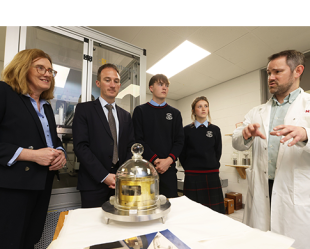Partnership for a better world
NSAI sign up to Training at European Level to ensure the needs of older persons and persons with disabilities are considered during the standardization process.
- Have you ever wondered why you can use your bank card anywhere in the world?
- Or that you can watch video footage (MPEG) delivered via the Web on any of the different computers you have access to?
- Or noticed that your baby's toy has no sharp edges?
That is because they comply with technical specifications which have been codified into voluntary agreements, called Standards.
On the 22nd and 23rd of February 2010 NSAI will host a Stand4All Workshop for Users and Standardizers on how to meet the needs of older persons and persons with disabilities in the writing of standards or revision of standards.
In today's increasingly global manufacturing and trading environment, consumers expect to benefit from a wider choice of goods and services, lower prices and more information. They want the purchases they make to be of quality, easy to use, safe and friendly to the environment.
Standards are one vital tool for reaching these objectives because they are developed within an open process that provides the opportunity for all stakeholders, including consumers, to express their view and to have those views considered.
It is important for the whole society that all people have access to products, services and environments. The importance of accessibility for older persons and persons with disabilities is more critical nowadays due to the increasing prevalence and complexity of technology in everyday life. This presents both opportunities and challenges to ensure that these people may participate in society on equal terms.
It is necessary to improve the accessibility of products, services and environments which further enhances the quality of life and reduces discrimination.
Standardization greatly influences the design of products and services that are of interest to the consumer and can therefore play an important role in this field. Older persons and people with disabilities are important consumer groups. People with disabilities represent today about 16 % of the working age European population and 9.3% of Irish population have a disability (CSO - 2006).
Currently their needs are not being adequately addressed when standards are made or revised. Standards that take into account the needs of these users will have much greater market relevance and help to make products and services more accessible and usable for ALL. 70 % of people with disabilities become disabled while they are already in the workforce. Standarization is also applicable to visual, auditory or tactile signals (such as raised dots, notches, sounds, pictograms or graphical symbols) so that any one signal will convey the same meaning to the users worldwide.
Standardization Organisation Bodies such as ISO and CEN recognise the need to include the requirements of older persons and person with disabilities in all relevant standards production an revision work. This can be clearly achieved by following the basic principles of : Universal or accessible design, consumer representation of older persons and people with disabilities and relevant information exchange.
At European level, the European Commission's Directorate-General for Employment, Social Affairs and Equal Opportunities initiated a Project called "Stand4All" in 2009.
Stand4All is a project that focuses on training for persons with disabilities to increase their effective participation in the standardization process and for experts in standardization to increase their awareness and knowledge of accessibility issues faced by persons with disabilities.
Next month NSAI Standardization Department with run a 2 day workshop in conjunction with the CEN Stand4All Project Team. This Project in NSAI is being run by Elizabeth O'Ferrall , Standards Officer whose portfolio includes Accessibility . The Project is supported nationally by the NDA , NCBI, IWA, and Age Action Ireland. Following completion of this Project it is proposed that a new Working Group representing older persons and persons with disabilities will be established . This working group scope will be to give a voice to consumers (specifically older persons and persons with disabilities) in the Standards Process. They will assist standardizers in understanding the problems of end users in accessing products or services.
Further information can be obtained from Elizabeth O Ferrall at 01 8073855 or email elizabeth.oferrall@nsai.ie



